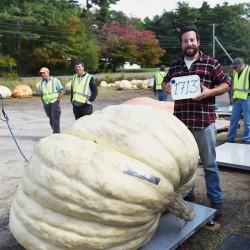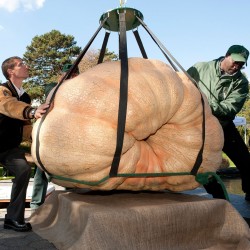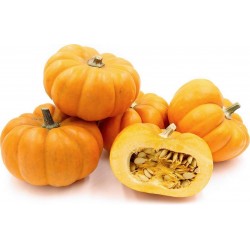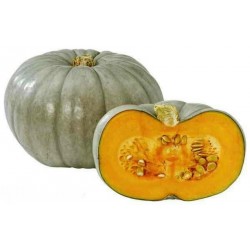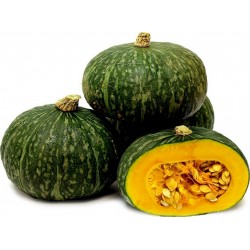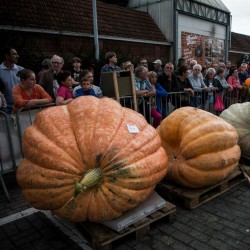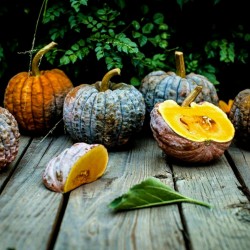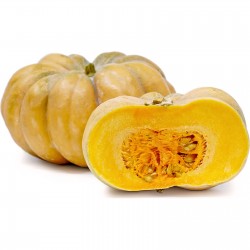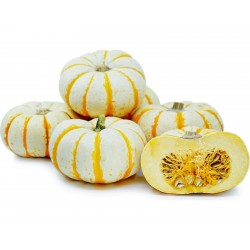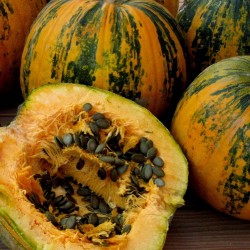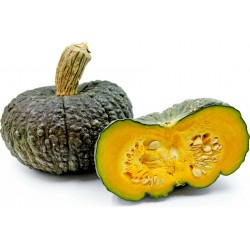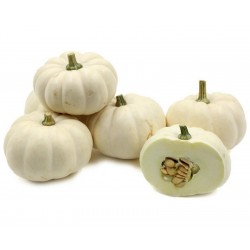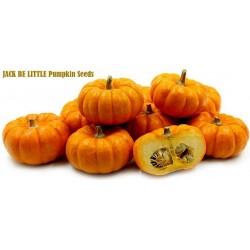
Giant plant (with giant fruits)
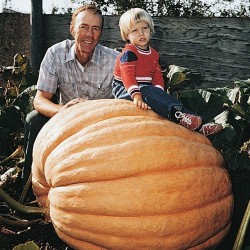
GOLIATH Giant Pumpkin Seeds
Regular price
€3.00
-15%
Price
€2.55
(SKU: VG 50)
Seeds Gallery EU,
5/
5
<h2><strong>GOLIATH Giant Pumpkin Seeds</strong></h2>
<h2><span style="color: #ff0000;"><strong>Price for Package of 4 seeds.</strong></span></h2>
<p>This is a monster of a pumpkin with fruits often in the weight of 400-500 kg and with a measurement of 3 m around, so ideal for competitions may be bright orange. Skin covers thick bright yellow-orange flesh, this is delicious in pies and don’t forget Halloween.</p>
<h2>How to Grow World Record Giant Pumpkins</h2>
<p>The world record for giant pumpkins is 2323.7 pounds, set by Beni Meier of Germany 2014. That's well over one ton!! People, who see these giant pumpkins, want to know "how do they grow them so big?" Growing pumpkins isn't difficult. Growing a big pumpkin takes a bit of work and effort. Growing a giant pumpkin, weighing a ton or more... now that takes a lot of effort and requires a lot of knowledge.</p>
<p>If you already grow pumpkins, you are off to a good start towards producing a monster this fall. As you enter the world of giant pumpkin growing, plan to spend much more time, to pamper and nurture your plants, to grow gigantic pumpkins at a phenomenal speed.</p>
<p>Did you Know? At peak growth, record-breaking giant pumpkins can grow 40-50 pounds a day, or more!</p>
<h2><strong><em>Top Ten Secrets to Growing Record-Breaking Giant Pumpkins:</em></strong></h2>
<ol>
<li>Super Soil - First, get out your soil tester, to assure that the soil pH is ideal for growing pumpkins. Average soil just will not do. Add ample amounts of compost and manure to your soil. It is best to till it into your soil in the fall, especially if the manure is raw (not decomposed). Check the pH again, after adding soil amendments.</li>
</ol>
<p></p>
<ol>
<li>Great Genetics -To grow a giant pumpkin, find seeds that have the genetics to grow huge fruit. Goliath Giant pumpkin seeds and Atlantic Giant pumpkin seeds are readily available. This will get you started. After a year or two of learning and attending the giant pumpkin weighoffs, you will come in contact with growers, who can give you some of the best genetic seeds available. The very best genetics are not available in stores. The top growers have them. Armed with good genetic seeds, you have the potential to grow your first, and hopefully record breaking, giant pumpkin. The rest is up to you.</li>
</ol>
<p></p>
<ol>
<li>An early, indoor start - Giant pumpkin plants require 140 days or more from the time you plant a seed, to the time you harvest the fruit. Growers seeking to break the world record, start seeds in mid to late April, and harvest fruit in early October. That means as many as 160 days, from when the seed was planted! Chances are, you will have to start them indoors. When you do, the young seedlings will need your attention, and as much sunlight as you can provide. It also means, you may need to provide cold and frost protection when you transfer them outdoors. As October nears, you may again have to protect them from cold and frost.</li>
</ol>
<p></p>
<ol>
<li>Lots of Fertilizer, the right stuff, at the right time - Throw away what you've learned about fertilizing, and re-learn the art of fertilizing giant pumpkins. It is truely an art form, as giant pumpkins require huge amounts of fertilizer. Start with a high nitrogen formula in the spring. Apply a high phosphorous fertilizer in advance of the blooming/fruit set stage. Finally, switch to a high potassium formula, for fruit growth and plant health.</li>
</ol>
<p></p>
<ol>
<li>Pour on the Water - The top growers have elaborate drip systems, to deliver the right amount of water (moist, not wet soil), 24/7. They add liquid fertilizers, fish emulsions, and seaweed fertilizer in their water tanks.</li>
</ol>
<p></p>
<ol>
<li>Liquid Calcium - All the fertilizer and nutrients in the world, can not be used efficiently, if soluble calcium is not present in your soil. Liquid calcium significantly increases the ability of plants to take up those nutrients and use them, to grow big fruit.</li>
</ol>
<p></p>
<ol>
<li>Nurturing Plant Growth and Pruning Vines - Prior to flowering and fruit set, the trick is to get your plant growing fast and furious. But, that's not enough. Here is how the top growers train and develop their vines: Grow the vines in a "Christmas tree" shape. Let secondary vines grow out and away from the main vine, to a length of 10' to 12'. At this point pinch off the growing tip, and bury it in the ground. Also, prune off any tertiary vines (those that grow off the secondary vine), as they appear. Pruning is vital, to maximize growth of the fruit. It encourages, or "trains" the vine, to focus upon sending nutrients to the fruit.</li>
</ol>
<p></p>
<ol>
<li>Promoting Secondary Root Growth - Secondary root growth can have a HUGE impact upon the final weight of the fruit. Secondary roots will form at the point where a a leaf stem meets the vine. Cover the vine at this point, with a couple inches of rich garden soil. Keep it well watered, and the roots will grow deeply. When fertilizing, feed secondary roots, too. More on Secondary Roots</li>
</ol>
<p></p>
<ol>
<li>Insect and Pumpkin Disease Protection - Many growers have had a great big pumpkin growing strongly on the vine, only to have it slowed, or even felled, by insect problems or plant disease. Pumpkins are susceptible to a number of insect and disease problems. Fortunately, there are insecticides and fungicides that will treat many of the most common pumpkin plant problems. It is vital to begin a treatment plant early, BEFORE insect or disease problems can take hold. Begin applying insecticides early in the season. Begin using fungicides before heat and humidity arrives in your area.</li>
</ol>
<p></p>
<ol>
<li>Shading the Fruit - Giant pumpkin fruit begins its life, as a soft shelled, yellow fruit. The skin is very pliable, allowing it to quickly grow and expand. Hot, sun and dry wind, can harden the skin, signaling the fruit to ripen. The trick, is to keep the skin soft, and pliable. Giant pumpkin growers quickly learn, that a shade cover over the fruit is essential to growing 'em big. Shade covers can be simple, or elaborate.</li>
</ol>
<p>Did You Know? Like regular field pumpkins, giant pumpkins are edible. There are plenty of recipes for cooking with giant pumpkins. But, the bigger they get, the coarser the texture of the pulp.</p>
<p>You are now armed with the top grower secrets to growing giant pumpkins. Now, go and plant some seeds, and produce a new, world record giant pumpkin!</p>
VG 50 (4 S)

- -15%
- New




